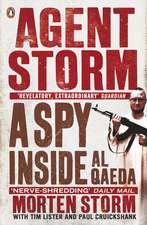The Diffusion of Military Technology and Ideas
Editat de Emily Goldman, Leslie Eliasonen Limba Engleză Hardback – 27 aug 2003
As military forces across the globe adopt new technologies, doctrines, and organizational forms suited to warfare in the information age, defense practitioners and academic specialists are debating the potential consequences of the "revolution in military affairs." The central question of this book is how such revolutions spread, to whom, how quickly, and with what consequences for the global balance of military power. The contributors to this volume—who include historians, political scientists, policy analysts, and sociologists—examine the diffusion of weapons technology, know-how, and methods of conducting military operations over the past two hundred years. The approach reflects the recent reawakening of interest in the relationship between culture and security.
The transition from the industrial age to the information age has impacted warfare much as it has other social institutions. Advances in precision weapons, surveillance satellites, robotics, and computer-based information processing, together with organizational changes that network military units, promise to create fundamentally new ways of war; the final outcome of the current revolution is unpredictable—as the North Korean missile program shows—but its global impact will hinge on how the revolution diffuses.
The transition from the industrial age to the information age has impacted warfare much as it has other social institutions. Advances in precision weapons, surveillance satellites, robotics, and computer-based information processing, together with organizational changes that network military units, promise to create fundamentally new ways of war; the final outcome of the current revolution is unpredictable—as the North Korean missile program shows—but its global impact will hinge on how the revolution diffuses.
Preț: 539.53 lei
Preț vechi: 700.70 lei
-23% Nou
Puncte Express: 809
Preț estimativ în valută:
103.29€ • 106.22$ • 85.69£
103.29€ • 106.22$ • 85.69£
Carte disponibilă
Livrare economică 28 ianuarie-11 februarie
Livrare express 11-17 ianuarie pentru 39.65 lei
Preluare comenzi: 021 569.72.76
Specificații
ISBN-13: 9780804745352
ISBN-10: 0804745358
Pagini: 440
Dimensiuni: 152 x 229 x 36 mm
Greutate: 0.76 kg
Ediția:1
Editura: Stanford University Press
Colecția Stanford University Press
ISBN-10: 0804745358
Pagini: 440
Dimensiuni: 152 x 229 x 36 mm
Greutate: 0.76 kg
Ediția:1
Editura: Stanford University Press
Colecția Stanford University Press
Recenzii
"With assiduous attention to the dynamics of diffusion—especially it's sensitivity to local contingencies within indigenous cultural settings—this volume succeeds in alerting policy makers to the challenges of advancing (or halting) the spread of technology. It further provides a salutary reminder that "software"—including robust but flexible habits of mind—is often more critical to military effectiveness than hardware."—William J. Astore, Defense Language Institute Foreign Language Center, Presidio of Monterey, California
"The editors have brought together an excellent collection of pieces on the diffusion of military technology."—Journal of Political and Military Sociology
"[The Diffusion of Military Technology and Ideas] is a notable scholarly achievement with profound implications for national and international security."—The International History Review
"With its broad and sophisticated approach, this volume brings a more expansive vision and greater theoretical rigor to the study of military diffusion. It also provides a useful framework for policymakers addressing an important but complex issue."—Technology and Culture
"This book offers a rich collection of research papers on very important topics....The authors were carefully chosen experts in history, political science, and sociology, who address the very important factors of national culture as they affect the application of new military technologies."—Naval War College Review
Notă biografică
Emily O. Goldman is Deputy Director for Interagency Coordination in the Office of Communication at U.S. Central Command. Leslie Eliason is Associate Professor and Program Head in the Department of International Policy Studies at the Monterey Institute of International Studies.
Textul de pe ultima copertă
“With assiduous attention to the dynamics of diffusion—especially it’s sensitivity to local contingencies within indigenous cultural settings—this volume succeeds in alerting policy makers to the challenges of advancing (or halting) the spread of technology. It further provides a salutary reminder that “software”—including robust but flexible habits of mind—is often more critical to military effectiveness than hardware.”—William J. Astore, Defense Language Institute Foreign Language Center, Presidio of Monterey, California
“The editors have brought together an excellent collection of pieces on the diffusion of military technology.”—Journal of Political and Military Sociology
“The editors have brought together an excellent collection of pieces on the diffusion of military technology.”—Journal of Political and Military Sociology
Descriere
As military forces across the globe adopt new technologies, doctrines, and organizational forms suited to warfare in the information age, defense practitioners and academic specialists are debating the potential consequences of the "revolution in military affairs." The central question of this book is how such revolutions spread, to whom, how quickly, and with what consequences for the global balance of military power.












